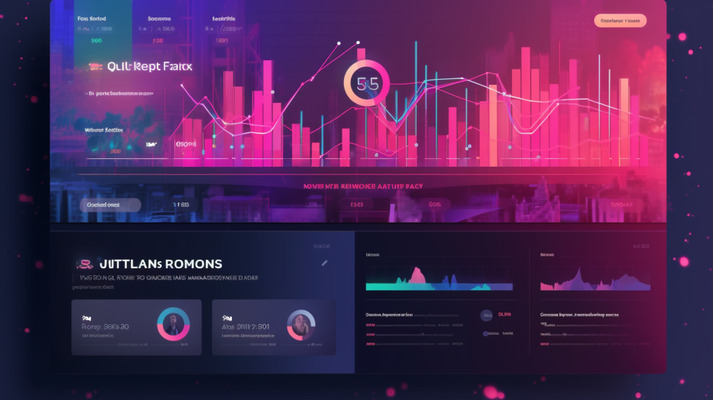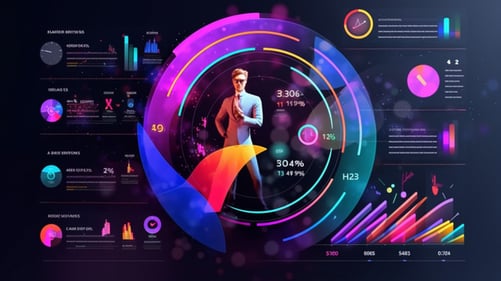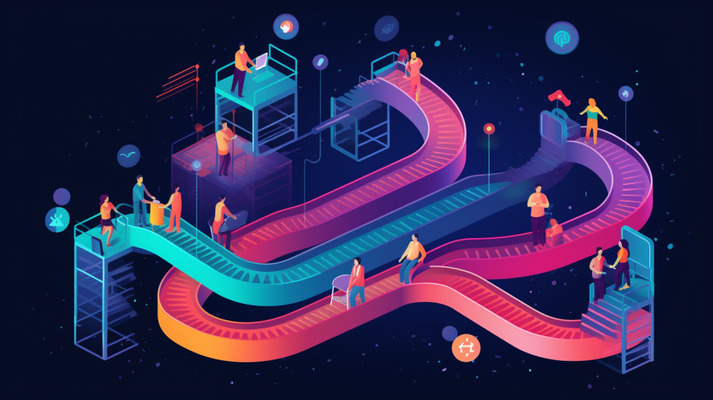How AI is Transforming Marketing in 2023
- Home
- How AI is Transforming Marketing in 2023
Artificial intelligence (AI) is rapidly transforming businesses across every industry. In marketing, AI is opening up new opportunities to gain strategic advantages and get higher returns from marketing efforts.
 Recent advances in AI allow marketers to leverage large volumes of data to extract actionable customer insights, create highly targeted campaigns, automate repetitive tasks, and generate new ideas faster than ever before. AI-powered tools are enabling marketers to optimize the customer journey, improve campaign performance, and increase marketing ROI.
Recent advances in AI allow marketers to leverage large volumes of data to extract actionable customer insights, create highly targeted campaigns, automate repetitive tasks, and generate new ideas faster than ever before. AI-powered tools are enabling marketers to optimize the customer journey, improve campaign performance, and increase marketing ROI.
According to recent research from MIT, companies could achieve up to a 20% increase in cash flow by incorporating AI into their marketing and sales processes. Another study by Deloitte found that early adopters of AI achieved an average 39% increase in revenue over competitors.
Some of the key ways marketers can augment their efforts with AI include:
- Automated campaign targeting and personalization using deep learning algorithms. AI can help create customized content and experiences matched to individual users.
- AI assistants can aid in campaign ideation, content creation, and budget allocation. These tools provide data-driven recommendations to streamline planning.
- Lead scoring and qualification using AI to identify and prioritize high-value leads based on historical data patterns. This improves sales conversion rates.
- Generating customer insights from data analytics, surveys, and other feedback sources using natural language processing. Marketers gain a deeper understanding of customers.
- Automating repetitive administrative tasks like reporting, data entry and monitoring campaign metrics. This frees up time for more strategic work.
As AI capabilities continue to rapidly evolve, marketing teams have an opportunity to realize game-changing benefits by strategically adopting these technologies. The companies getting ahead today are thoughtfully integrating AI into their existing workflows to unlock greater productivity and marketing performance.
This article explores the critical applications of AI in marketing and provides practical guidance on how teams can start putting AI to work for their organization.
Optimizing Campaigns with AI
Using AI for data-driven campaign targeting and personalization

One of the most powerful applications of AI in marketing is optimizing campaign targeting and personalization to boost results. By leveraging large volumes of customer data, AI algorithms can identify the best audiences and craft tailored messaging and experiences for each segment.
For example, machine learning tools can analyze past campaign performance data and customer attributes to predict which users are most likely to engage and convert. Marketers can then refine their targeting to focus their budget on high-value prospects.
Consumer goods company Unilever increased clicks on ads by 30% and purchases by 10% using AI-powered targeting from Facebook. The AI algorithm adjusts bids and creatives in real-time based on predicted user engagement.
Leveraging AI assistants for campaign planning and ideation
AI assistants like AcuityAds' AI-Powered Recommendation Engine act as always-on members of the marketing team. They provide data-driven recommendations on optimal media mix, messaging, and budget allocations to achieve campaign goals.
Agency Merkle leveraged AI assistance for a client’s campaign that improved ROI by 15%. The AI rapidly processed data on past campaigns and made suggestions for the upcoming launch, cutting the planning cycle from 12 weeks to 4.
For personalization, AI tools like Optimove use machine learning on customer data to identify micro-segments within an audience. Tailored messaging for each micro-segment resonates better than a one-size-fits-all approach.
Cosmetics brand Sephora achieved a 36% increase in email marketing revenue after incorporating AI-powered personalization from Qubit. The AI selects the optimal product recommendations, wording, images and offers for each customer.
As these examples illustrate, baked-in AI capabilities can significantly improve the performance of digital campaigns compared to a generalized human approach. Marketers should identify areas where AI-driven targeting and creativity will maximize relevance and optimize spend.
Generating Leads with AI
AI tools for creating targeted and customized landing pages

AI can help marketers generate higher-quality leads by creating customized landing pages and accurately identifying high-potential prospects.
Tools like Instapage and Unbounce utilize AI to dynamically optimize landing pages in real time. The AI algorithm tests variations of headlines, copy, layouts, images, calls-to-action, and more to determine the optimal page design for converting visitors.
For example, AI on Instapage helped health technology company Byte improve conversions by 50% by continually refining page elements to maximize lead generation.
Automated lead scoring and qualification using AI
Once leads are captured, AI powers the process of scoring them based on historical data to focus sales efforts on qualified accounts. Conversica uses natural language processing to analyze interactions and determine if leads are sales-ready.
The AI assesses behaviours like email engagement, document downloads, and survey responses to score leads. It automatically routes ready leads to sales while nurturing others with automated messaging.
Insurance company Mutual of Omaha increased conversions from leads by 15% using Conversica’s AI lead qualification. The AI freed up sales representatives to focus only on engaging hot leads.
AI takes the guesswork out of determining lead priority and sales-readiness. By combining multiple data signals, it provides a more accurate predictive picture than manual human methods.
To turn visitors into high-quality leads, marketers should leverage AI's abilities to optimize landing page design and automatically identify and route qualified prospects to sales teams.
AI for Customer Insights
Using AI to analyze customer data and identify trends
 Gaining a deeper understanding of customers through data analytics and feedback analysis is critical for informing marketing strategies. AI tools are particularly well-suited for processing large volumes of customer data to uncover actionable insights.
Gaining a deeper understanding of customers through data analytics and feedback analysis is critical for informing marketing strategies. AI tools are particularly well-suited for processing large volumes of customer data to uncover actionable insights.
For example, machine learning algorithms can quickly analyze customer attributes, behaviors, preferences, and more to identify trends and segments within a customer base. Brands use these insights to develop targeted positioning and messaging.
Cosmetics retailer Sephora employed AI analytics on its customer data to reveal distinct consumer personalities and recommend products best suited for each segment. This granular understanding led to better personalization.
Gathering insights from customer feedback/surveys with NLP
Sentiment analysis using natural language processing is another powerful application of AI. By scanning verbatim customer feedback and survey responses, marketers can identify common themes and measure brand sentiment over time.
Software company HubSpot leveraged AI sentiment analysis on thousands of customer NPS surveys to better understand brand perception. The AI uncovered key drivers of NPS scores enabling more focused customer experience improvements.
An emerging use of AI is employing conversational bots to engage customers in ongoing dialogs and solicit feedback through interactive chat conversations. This provides a convenient channel for capturing insights.
Social listening with AI to understand brand sentiment
Finally, marketers can apply AI-powered social listening tools to analyze brand mentions and conversations happening on social media platforms. AI can detect emerging trends, customer complaints, shifts in sentiment, and more.
With AI’s ability to derive meaning from unstructured data, marketing teams can gain a multidimensional view of their customers without solely relying on questions-based research. These behavioral and conversational insights fuel data-driven decisions.
AI-Powered Content Creation
Automating content drafting for blogs/social media

AI tools have opened up new possibilities for automating and personalizing content creation to increase marketing reach and resonance.
Tools like Jasper and Phrasee leverage natural language generation to automatically create initial drafts of blog posts, social media captions, emails, and more based on brief headings. This content can then be refined by marketers.
Jasper claims its AI can write a 500-word human-quality blog post in under 60 seconds, saving significant time and overhead for content teams.
For personalization, tools like Persado analyze customer data to generate emotionally-resonant wording tailored to messaging preferences of each segment.
Persado’s AI-generated personalized subject lines for an education company’s email campaign, improved open rates by up to 41% compared to human-written versions.
Ethical considerations around AI-generated content
While AI content creation tools offer productivity benefits, marketers should ensure human oversight of messaging to maintain quality and brand suitability. Ethically, auto-generated content should not completely replace the creativity, nuance and style of human writers.
Marketers should also be transparent if the content has been machine-generated to build consumer trust and avoid deception. Drafting assistance from AI can be beneficial but ultimately the human is responsible for final content quality and relevance.
With the right balance of human and AI collaboration, marketers can scale content output to meet rising digital demands while also maintaining a distinctive brand voice and personalized experiences.
Getting Started with AI in Marketing

With proven benefits for optimizing marketing performance, many teams are now looking to pilot AI technologies but may be unsure how to get started. Here are the best practices for launching an AI marketing program:
Select one marketing task or channel to implement AI as a test before scaling more broadly. This allows you to assess capabilities and impact. Email marketing and lead scoring are common starting points with quick potential ROI.
Look for AI solutions that seamlessly integrate with your existing tools and workflows like CRM rather than disrupting processes. This increases adoption across teams. Also identify if process changes are needed to capture the full value.
Measuring incremental ROI as you scale AI adoption
Define quantitative KPIs upfront to track the impact of your AI pilot against. This could include metrics like conversion rates, lead volume, campaign efficiency, or marketing ROI. Without clear goals, it’s difficult to discern value.
Scale thoughtfully - Based on the results of initial tests, identify other high-impact areas to scale AI usage. Expanding incrementally allows you to continually measure and optimize performance.
Enable hybrid models - Look for opportunities to pair AI and human capabilities for optimal results. For example, having AI generate content drafts and human editors refine them. Hybrid models maintain quality while improving efficiency.
With this disciplined approach, marketing teams can build the business case for AI and gain internal stakeholder support for further adoption. The key is showcasing incremental ROI by identifying the right starting points and metrics to quantify impact. Over time AI can transform marketing capabilities and fuel broader digital transformation.
Conclusion:
Summary of how AI can augment marketers to get more done
 The applications of AI in marketing are rapidly evolving to open up new possibilities for optimizing campaigns, generating leads, understanding customers, creating content and more. As the examples in this article illustrate, AI is already helping marketers get higher ROI and accomplish more than ever before.
The applications of AI in marketing are rapidly evolving to open up new possibilities for optimizing campaigns, generating leads, understanding customers, creating content and more. As the examples in this article illustrate, AI is already helping marketers get higher ROI and accomplish more than ever before.
When strategically deployed, AI augments human capabilities to drive step-change improvements:
Machine learning algorithms crunch vast amounts of data to uncover optimal targeting and personalization at a scale no human team can match.
AI assistants surface data-driven recommendations and strategies human marketers may overlook or take weeks to formulate. This boosts productivity.
Natural language processing of customer conversations provides sharper behavioural insights that inform customer-centric product and messaging strategies.
Automated content creation solves capacity challenges, although human creativity still leads ideation and provides quality control.
The future of AI in marketing - emerging innovations
Exciting innovations on the horizon include AI platforms that automatically optimize the entire customer journey rather than just applications in campaign management, social listening, and analytics.
Forrester predicts over 75% of marketing organizations will be using AI in some form within 2 years. Marketers have an opportunity to embrace this intelligence revolution to gain a competitive advantage and meet rising customer expectations.
The future vision is seamless human-AI collaboration, with the machine handling routine analytical and operational tasks while marketers focus on creativity, strategy, and the human element of branding. By proactively exploring and testing AI capabilities today, marketing teams can realize this future faster.
Frequently Asked Questions About AI in Marketing
Q: How can I get buy-in at my company to pilot AI marketing initiatives?
A: Emphasize the tangible business benefits proven by other companies, focus on quick wins, and start small to demonstrate incremental ROI. Outline how AI will augment your team’s existing capabilities.
Q: Which marketing tasks should we prioritize for automating with AI?
A: Look for high-volume repetitive tasks like report generation, data processing, and campaign analysis that can be handed off to AI. Also evaluate campaign targeting, lead scoring and content writing as candidates for automation.
Q: What skills do marketers need to work alongside AI technologies?
A: Creativity, empathy and communication skills remain critical. Analytical skills are still needed to frame problems for AI and interpret its outputs. Being adaptable and curious about new technologies will help marketers thrive alongside AI.
Q: How can we ensure the responsible use of AI in marketing?
A: Have strict human oversight on AI applications, audit for biases, and be transparent with customers. AI should augment human marketers rather than replace them. Make sure brand values lead to technology use.
Q: What are the risks of automating too much of marketing with AI?
A: Potential lack of originality and nuance in messaging, loss of one-to-one human connections with customers, and over-reliance on technology. Keep the human touch while gaining AI efficiencies.
Q: How can we select the right AI marketing tools for our needs?
A: Outline your key objectives, gaps and use cases. Seek trusted vendors with proven success supporting similar marketing needs. Start with limited pilots and don't overcommit upfront before validating capabilities.
Q: What's the best way to measure ROI from AI marketing initiatives?
A: Set clear target KPIs and benchmarks tied to business impact—audit across the customer lifecycle. Be open to both quantitative and qualitative indicators like customer satisfaction.

